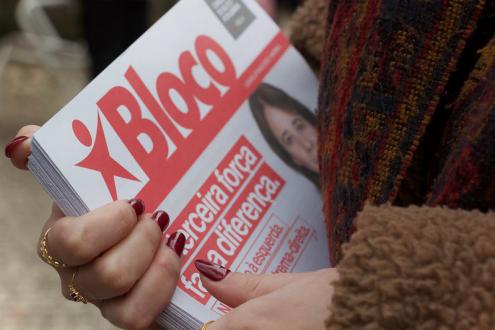On 30 January elections Portuguese legislative elections took place for the parliament. The ruling Socialist Party (PS) won a convincing majority of seats while the main radical party the Left Bloc, known in Portuguese as “Bloco”, suffered a severe setback. Bloco is a radical broad left and ecosocialist party that includes the supporters of the Fourth International in Portugal with whom ecosocialist.scot is linked. Below we publish an original article specially written by an activist in Bloco for ecosocialist.scot reflecting on the result and the challenges it poses for radical militancy.
What happened by the end of January was to be expected. The Socialist Party (PS) created an artificial crisis that put Bloco in check. However, the artificialness of the crisis did not make it any less real in the way it was perceived, especially when facing a right wing that brings back the ghosts of the most recent past – Troika – and of the most distant past – fascism. The strategy of eroding the government that had been the Bloco’s strategy was not enough to open space for an alternative narrative to the PS’s “stability”, nor to disarm the right wing. Fear shifted Bloco and CDU (the coalition of Communist and Green parties) votes to the PS. We should not antagonize it, let’s understand it.
The absolute majority of the PS has two effects: on the one hand, it allows PS to assert itself as the battlefront to the increasingly extreme right; on the other hand, the centrality of Parliament to which we have become used to will be overshadowed, making it difficult for Bloco to capitalize on the media presence that Parliament has guaranteed it. With these two effects, the PS has initiated the process of cannibalizing the left, in an attempt to occupy all of its space. This cannibalization entails future threats. In an electoral scenario of a few weeks, the quick response and the call for stability were an easy tool in the hands of the PS. However, in the long run, the strategy of a PS with absolute majority will not tackle the rise of the right. It may even aggravate it by failing to match the policy pursued with the demands, or needs, of the country.
In response to Boaventura de Sousa Santos, Fernando Rosas wrote, in the newspaper Público, that the left had to oppose the Troika’s labour laws, “the maintenance of the severe needs that put the SNS (Portuguese NHS) at risk due to the privatisation attempt, or the low salaries and pensions”, just some of the specific problems that move us. From now on, it is important to rethink our form of action facing a difficult task: to overcome the politics of fear, without underestimating it, and to sow hope for a future, trying to be the engines of re-establishing democratic responsiveness. But we will not do this easily. Despite the parliamentarisation of politics, due to the shift of the institutional political axis to Parliament during the Geringonça [1], we have committed ourselves to fighting on the street which is an important political and strategic conviction, part of our DNA – let us remember the historic 2019 Feminist Strike. Nevertheless, the institutional design that came out of the January elections makes the organization of the social movement even more crucial, and without militancy, there is no organization.
What kind of militancy do we need?
We are talking about what some political scientists call the “militant with a purpose”, and not just a member or someone that socially navigates the spaces of militancy. This militant may be driven by a strong ideological commitment, or by specific goals, driven by specific fights. These are not mutually exclusive. The latter can lead to the former, the former can give meaning to the latter, integrating it into a set of demands capable of rewriting the meaning of words that we have used but that, in many cases, have been emptied of meaning: “public”, “solidarity”, “democracy”, “justice”, “freedom”, “equality”. (Look at the Portuguese liberal party’s “freedom”).
Nearly 50 years after the Revolution [of 1974], it has been proven that the survival of the meaning that gave words their meaning is not eternal, but it is possible to give that meaning back to them by organising specific fights, articulating them, arranging them under those same endangered meanings. Let’s look at [the outcomes of the recent elections in] Chile: Boric would not have won if, in 2019, a popular movement had not been generated contesting the increase in the price of public transport that made clear the Chilean government’s disregard for the outskirts of the big cities, serving as a starting point for other claims; if this movement had not been joined by a strong feminist movement around the right to abortion; if all these fights had not culminated in the need for a new Constitution, the (re)launching pad for the Chilean left.
Let us keep this in mind: a bus ticket helped prove the need for a new political and social pact.
The 2022 [Portuguese] legislative elections call for a serious reorganisation process that must necessarily include rethinking militancy, establishing a serious relationship with the social movement, and becoming independent of the media and social networks.
Only deep roots prevent the tree from falling with the wind.
Article written by Mafalda Escada, translated by Patrícia Felício, and published with grateful thanks from ecosocialist.scot.
Note: [1] The geringonça, or ‘contraption’, was the name given to the political situation that emerged from the 2015 legislative elections, in which no party had a majority.
See also:
Socialist” Party wins but defeat for left in Portuguese elections, by Dave Kellaway https://internationalviewpoint.org/spip.php?article7507
On the Portuguese elections and the Left Bloc result https://www.esquerda.net/en/artigo/portuguese-elections-and-left-bloc-result/79284
Brief outcome of the Portuguese 30th of January general elections https://www.esquerda.net/en/artigo/brief-outcome-portuguese-30th-january-general-elections/79285
Left Bloc website articles in English https://www.esquerda.net/english



